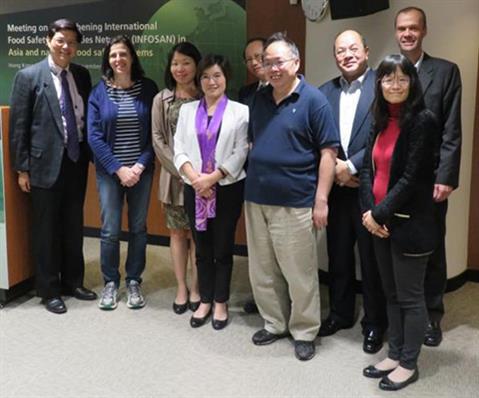
MANILA - As health security issues, including food safety issues, cross international borders and new issues continue to emerge, new ways of working are needed along with stronger strategic partnerships between WHO and WHO collaborating centres.
WHO food safety collaborating centres in the Western Pacific Region were convened for the first time in November 2015 as a side event to the Meeting on Strengthening the International Food Safety Authorities Network in Asia and National Food Safety Systems. They came together to review their work, share good practices and identify directions for enhanced strategic collaboration.
The meeting was hosted by the Centre for Food Safety, Food and Environmental Hygiene Department, Hong Kong SAR, China (WHO Collaborating Centre for Risk Analysis of Chemicals in Food) and attended by Food Standards Australia New Zealand (WHO Collaborating Centre for Food Contamination Monitoring); China National Centre for Food Safety Risk Assessment (WHO Collaborating Centre for Food Contamination Monitoring); and Food Safety Laboratory, Health Sciences Authority, Singapore (WHO Collaborating Centre for Food Contamination Monitoring), with WHO serving as secretariat.
This was the first opportunity for the food safety collaborating centres in the Region and WHO to meet to discuss strategic areas and means of collaboration.
The four centres had joined (in person or via videoconference) the first forum of WHO collaborating centres in the Western Pacific in November 2014. Their meeting in November 2015 took forward agreements from the regional forum, such as sharing and using good practices in collaborative partnerships, including enhanced communication and consultative planning of work. With WHO, the centres agreed that their terms of reference should be revisited to better reflect regional food safety priorities and build on each centre's strengths. The centres should take a more active role in WHO's regional food safety programme, including through in-country technical and scientific advice, capacity-building, food analysis services and development of guidelines, training materials and standard operating procedures. The centres may also consider hosting regional meetings and events. Further, the participants agreed that governments should be informed of the work of WHO collaborating centres and how they contribute to strengthen food safety in the Region.
With WHO, the centres agreed that their terms of reference should be revisited to better reflect regional food safety priorities and build on each centre's strengths. The centres should take a more active role in WHO's regional food safety programme, including through in-country technical and scientific advice, capacity-building, food analysis services and development of guidelines, training materials and standard operating procedures. The centres may also consider hosting regional meetings and events. Further, the participants agreed that governments should be informed of the work of WHO collaborating centres and how they contribute to strengthen food safety in the Region.
Share highlights from your work as a WHO collaborating centre with whoccforum@wpro.who.int to be published on this website

/59748.tmb-300v.png?sfvrsn=9885965b_2)


